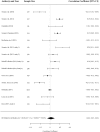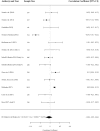A Systematic Review and Meta-Analysis of Psychological Research on Conspiracy Beliefs: Field Characteristics, Measurement Instruments, and Associations With Personality Traits
- PMID: 30853921
- PMCID: PMC6396711
- DOI: 10.3389/fpsyg.2019.00205
A Systematic Review and Meta-Analysis of Psychological Research on Conspiracy Beliefs: Field Characteristics, Measurement Instruments, and Associations With Personality Traits
Abstract
In the last decade, the number of investigations of the beliefs in conspiracy theories has begun to increase in the fields of social, differential, and experimental psychology. A considerable number of variables have been suggested as predictors of conspiracy beliefs, amongst them personality factors such as low agreeableness (as disagreeableness is associated with suspicion and antagonism) and high openness to experience (due to its positive association to seek out unusual and novel ideas). The association between agreeableness, openness to experience and conspiracy beliefs remains unclear in the literature. The present study reviews the literature of psychological studies investigating conspiracy beliefs. Additionally, the association between Big Five personality factors and conspiracy beliefs is analyzed meta-analytically using random-effects models. Ninety-six studies were identified for the systematic review. A comprehensive account of predictors, consequences, operationalization, questionnaires, and most prominent conspiracy theories is presented. For meta-analysis, 74 effect sizes from 13 studies were extracted. The psychological literature on predictors of conspiracy beliefs can be divided in approaches either with a pathological (e.g., paranoia) or socio-political focus (e.g., perceived powerlessness). Generally, there is a lack of theoretical frameworks in this young area of research. Meta-analysis revealed that agreeableness, openness to experience, and the remaining Big Five personality factors were not significantly associated with conspiracy beliefs if effect sizes are aggregated. Considerable heterogeneity in designs and operationalization characterizes the field. This article provides an overview of instrumentation, study designs, and current state of knowledge in an effort toward advancement and consensus in the study of conspiracy beliefs.
Keywords: big five; conspiracy beliefs; conspiracy theories; measurement; meta-analysis; personality traits; systematic review.
Figures



Similar articles
-
Contemporary trends in psychological research on conspiracy beliefs. A systematic review.Front Psychol. 2023 Feb 8;14:1075779. doi: 10.3389/fpsyg.2023.1075779. eCollection 2023. Front Psychol. 2023. PMID: 36844318 Free PMC article.
-
Germany under the Tinfoil Hat? The associations of the big five personality traits and coronavirus conspiracy beliefs with the intention to get vaccinated.J Infect Public Health. 2024 Sep;17(9):102519. doi: 10.1016/j.jiph.2024.102519. Epub 2024 Aug 17. J Infect Public Health. 2024. PMID: 39173556
-
Moral foundations are better predictors of belief in COVID-19 conspiracy theories than the Big Five personality traits.Front Psychol. 2023 Aug 24;14:1201695. doi: 10.3389/fpsyg.2023.1201695. eCollection 2023. Front Psychol. 2023. PMID: 37691810 Free PMC article.
-
Mistrust and Beliefs in Conspiracy Theories Differently Mediate the Effects of Psychological Factors on Propensity for COVID-19 Vaccine.Front Psychol. 2021 Jul 7;12:683684. doi: 10.3389/fpsyg.2021.683684. eCollection 2021. Front Psychol. 2021. PMID: 34305736 Free PMC article.
-
Reasons to believe: A systematic review and meta-analytic synthesis of the motives associated with conspiracy beliefs.Psychol Bull. 2025 Jan;151(1):48-87. doi: 10.1037/bul0000463. Psychol Bull. 2025. PMID: 39913483
Cited by
-
[Conspiracy narratives in the context of the coronavirus pandemic].Psychotherapeut (Berl). 2021;66(3):203-208. doi: 10.1007/s00278-021-00498-2. Epub 2021 Feb 22. Psychotherapeut (Berl). 2021. PMID: 33642698 Free PMC article. Review. German.
-
Alternative beliefs in psychedelic drug users.Sci Rep. 2023 Sep 30;13(1):16432. doi: 10.1038/s41598-023-42444-z. Sci Rep. 2023. PMID: 37777572 Free PMC article.
-
Conspiracy endorsement and its associations with personality functioning, anxiety, loneliness, and sociodemographic characteristics during the COVID-19 pandemic in a representative sample of the German population.PLoS One. 2022 Jan 28;17(1):e0263301. doi: 10.1371/journal.pone.0263301. eCollection 2022. PLoS One. 2022. PMID: 35089987 Free PMC article.
-
When alienated from society, conspiracy theory belief gives meaning to life.Heliyon. 2024 Jul 14;10(14):e34557. doi: 10.1016/j.heliyon.2024.e34557. eCollection 2024 Jul 30. Heliyon. 2024. PMID: 39149052 Free PMC article.
-
Contemporary trends in psychological research on conspiracy beliefs. A systematic review.Front Psychol. 2023 Feb 8;14:1075779. doi: 10.3389/fpsyg.2023.1075779. eCollection 2023. Front Psychol. 2023. PMID: 36844318 Free PMC article.
References
-
- Aaronovitch D. (2009). Voodoo Histories: The Role of The Conspiracy Theory in Shaping Modern History. London: Jonathan Cape.
-
- Abalakina-Paap M., Stephan W. G., Craig T., Gregory W. L. (1999). Beliefs in conspiracies. Polit. Psychol. 20, 637–647. 10.1111/0162-895X.00160 - DOI
-
- Ballová Mikušková E. (2017). Conspiracy beliefs of future teachers. Curr. Psychol. 37, 692–701. 10.1007/s12144-017-9561-4 - DOI
-
- Barlow D. H., Durand M. V. (2009). Abnormal psychology: An Integrative Approach, 5th Edn. Belmont, CA: Wadsworth Cengage.
-
- Barron D., Morgan K., Towell T., Altemeyer B., Swami V. (2014). Associations between schizotypy and belief in conspiracist ideation. Pers. Individ. Dif. 70, 156–159. 10.1016/j.paid.2014.06.040 - DOI
Publication types
LinkOut - more resources
Full Text Sources

